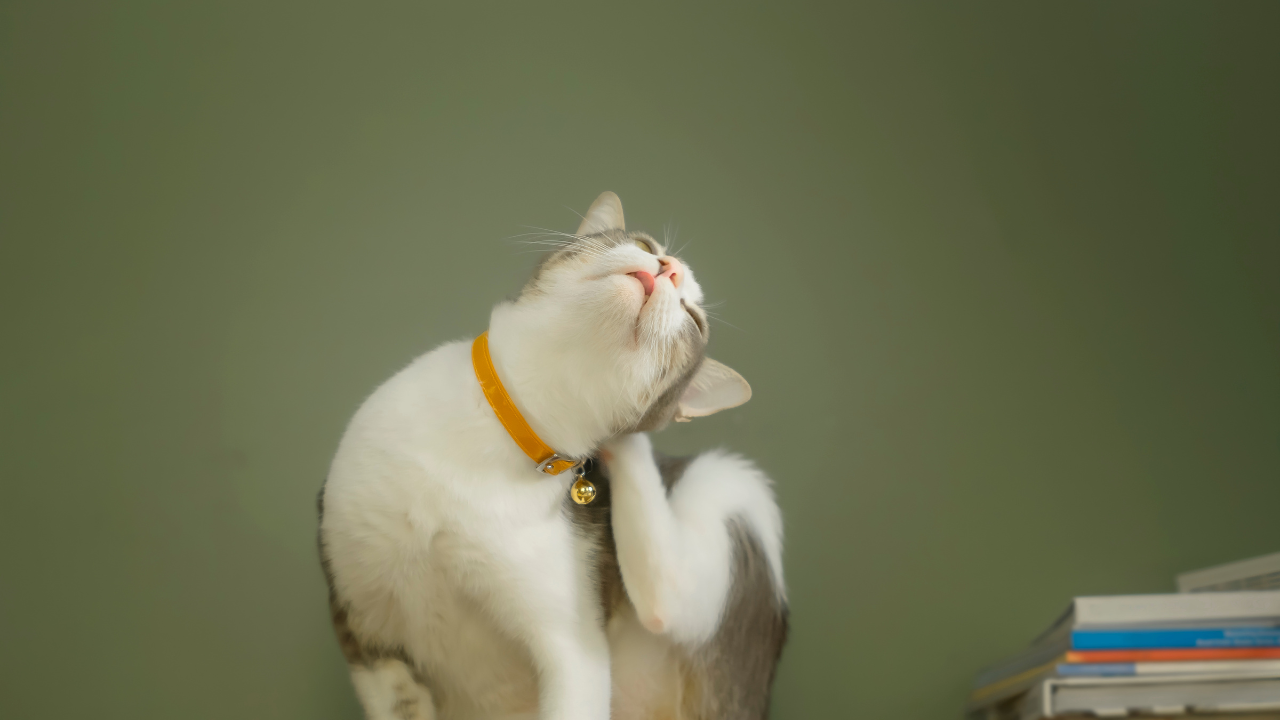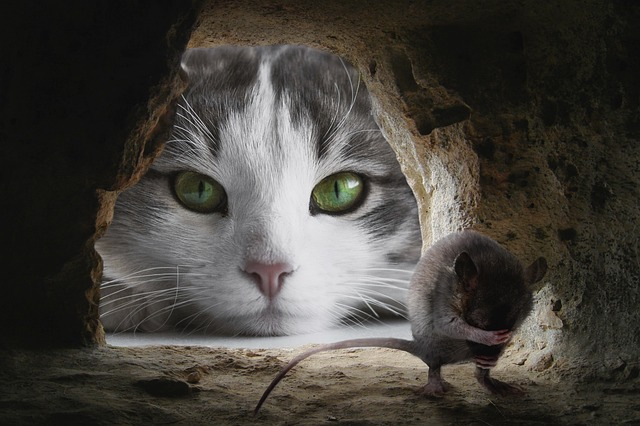
In this blog post we will cover the symptoms of cat food allergies and food intolerances. While food intolerance is relatively common, a true food allergy is much less common, and requires a novel protein diet given during a food trial to arrive at a diagnosis.
What Veterinary medicine has found about the incidence of food allergies
Cats, being obligate carnivores, have unique nutritional requirements. While food allergies in cats share similarities with those in dogs, there are some notable differences. According to the position statement on food allergies by the American Veterinary Medical Association (AVMA), the incidence of food allergies in cats is still unclear(1). However, it is believed that up to 30% of cats with chronic gastrointestinal symptoms may have a food allergy as a component of their symptoms (2). Food allergy symptoms can appear at any time in a cat's life and can even be seen in young cats. Cats may have eaten the offending cat food for years before having issues.
Symptoms of Food Allergies in Cats:
Recognizing allergy symptoms in cats is vital for early intervention. Cats with food allergies often exhibit skin-related issues such as itching, redness, rashes, and excessive grooming, especially around the face and ears, whereas dogs may be itchy all over. Cats will also be more likely to have respiratory signs.
Gastrointestinal symptoms like vomiting and diarrhea may occur in up to 20% of cats with food allergy. It's important to note that food allergies in cats may present differently compared to dogs, where gastrointestinal signs of allergic reaction are more prominent.
Do inhalant allergies coexist with other allergies?
Food allergies in cats can often coexist with other allergies, including environmental allergies and atopic dermatitis. According to research12, food allergy can be a trigger factor for conditions like atopic dermatitis. Cats with food allergies may also exhibit other clinical signs when food allergies occur such as urticaria, recurrent pyoderma, and respiratory symptoms.
Understanding the Importance of the Microbiome in Inflammatory Bowel Disease and Food Allergies in Cat's food allergies
The microbiome, which refers to the collection of microorganisms that reside within the gastrointestinal tract, plays a crucial role in the overall health and well-being of cats. Recent research has highlighted the significance of the microbiome in the development and management of inflammatory bowel disease (IBD) and food allergies in cats. Understanding the unique needs of cats as obligate carnivores and the impact of elimination diets on their microbiome can provide insights into the underlying causes of these conditions.
The Unique Needs of Cats as Carnivores:

Cats have evolved as obligate carnivores, meaning their bodies are adapted to obtain essential nutrients from animal-based proteins. Unlike omnivorous animals, cats have specific dietary requirements that cannot be met by plant-based ingredients alone. The high protein content found in animal tissues is necessary for their growth, energy production, and overall health. Deviating from this carnivorous diet may trigger a cat's immune system to react to a microbiome that is not consistent with a carnivore diet. The imbalance in the cat's immune system overreacts to gut microbiome cause many cats to have subsequent health issues.
Diagnosing Food Allergies in Cats:
Diagnosing food allergies in cats can be challenging due to the lack of reliable and specific laboratory tests. Unlike other types of allergies, such as pollen or dust mite allergies, there is no definitive blood or skin test for food allergies in cats. The AVMA position statement emphasizes that the gold standard for diagnosis is an elimination diet trial. This involves feeding the cat a novel protein and carbohydrate source for a period of 8 to 12 weeks while closely monitoring for any improvement in symptoms.
Limitations of Hydrolyzed Protein Diets:
Hydrolyzed protein diets are often recommended for cats with food allergies. These diets contain proteins that have been broken down into smaller components, making them less likely to trigger an allergic response. However, it is important to note that hydrolyzed protein diets may still contain trace amounts of protein from the original species, which could be problematic for cats with severe allergies1. It is advisable to discuss the suitability of your cat's symptoms for hydrolyzed protein diets with your veterinarian.
An altered microbiome can contribute to Inflammatory Bowel Disease and Food Allergy:
Numerous studies have highlighted the role of the microbiome in the development and management of inflammatory bowel disease and food allergies in cats. Research has shown that alterations in the composition and diversity of the gut microbiota can contribute to chronic intestinal inflammation seen in IBD (3).
Dysbiosis, an imbalance or disruption of the normal microbial community, has been associated with increased susceptibility to food allergies and adverse food reactions in cats.
The gut microbiome plays a vital role in the regulation of immune responses and the maintenance of intestinal barrier function. Disruptions in the microbiome can compromise the integrity of the intestinal lining, leading to increased permeability called "leaky gut" which allows allergens to cross into the bloodstream, triggering immune responses and allergic reactions.
Elimination Diets and the Microbiome:
Elimination diets are commonly used in the diagnosis and management of food allergies in cats. These diets involve removing potential allergenic ingredients and introducing novel protein and carbohydrate sources.
Dry kibble-based elimination diets can have a significant influence on the microbiome due to their low moisture content and high carbohydrate content. Cats have a limited ability to metabolize carbohydrates effectively, and an excess of carbohydrates can disrupt the balance of the gut microbiota known as "dysbiosis". This disruption can lead to inflammation and immune disregulation.
Deviating from this carnivorous diet may trigger a cat's immune system to react to a microbiome that is not consistent with a carnivore diet and contribute to subsequent health issues.
Promoting a Healthy Microbiome in Cats:
Maintaining a healthy gut microbiome is essential for the overall well-being of cats. To support a healthy microbiome, it is important to provide a balanced and species-appropriate diet that meets their specific nutritional needs as obligate carnivores. High-quality, protein-rich cat foods that contain limited amounts of carbohydrates can help promote a healthy balance of gut bacteria.
In addition to a nutritious diet, probiotics and prebiotics can be beneficial for supporting a healthy gut microbiome in cats. Probiotics are live microorganisms that can confer health benefits when consumed in adequate amounts. Prebiotics, on the other hand, are non-digestible fibers that serve as a food source for beneficial gut bacteria, promoting their growth and activity.
The microbiome plays a crucial role in the development and management of inflammatory bowel disease and food allergies in cats. Understanding the unique needs of cats as carnivores and the impact of elimination diets on their microbiome can provide insights into the underlying causes of these conditions.
By promoting a healthy gut microbiome through appropriate nutrition and considering the potential effects of elimination diets on the microbiome, we can better manage these conditions and improve the overall health and well-being of our feline companions.
Footnotes
- American Veterinary Medical Association (AVMA) (2017). [Position Statement on Food Allergies]
- BSAVA (2017). Food allergies. In BSAVA Small Animal Formulary (9th ed., pp. 307-308). British Small Animal Veterinary Association.
- Guilarte, M., et al. (2019). Characterization of the fecal microbiota in cats with inflammatory bowel disease or alimentary small cell lymphoma. Scientific Reports, 9(1), 19208. doi: 10.1038/s41598-019-55691
- Gueniche, A., & Bastien, P. (2014). Probiotics and prebiotics: Their role in the management of gastrointestinal disorders in adults. Nutrition in Clinical Practice, 29(6), 826-843. doi: 10.1177/0884533614550251 ↩













